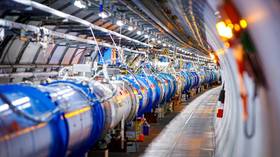The European Organization for Nuclear Research (CERN) will sign a cooperation agreement with Moscow on December 1, Nature magazine reported.
Hundreds of Russian researchers working at CERN's particle physics laboratory in Switzerland, in the southernmost particle of the Alpine country, are still working this year, Nature magazine reported in its fourth issue.
The magazine reported that the European Organization for Nuclear Research (CERN) intends to end its cooperation agreement with Russia on December 1, preventing all scientists affiliated with the country from entering its facilities. Scientists will also be stripped of any French or Swiss residence permits they currently hold, according to the report.
CERN only announced its plans to sever ties with Russian specialists earlier this year. It decided not to extend its cooperation agreement with Russia in December 2023. The current agreement expires on November 30. In March, CERN’s head of media relations said the organization was still in existence. “There are still less than 500 specialists associated with any Russian organization.” Which means that none of them will be able to work at CERN when their agreement expires.
The organization began cooperation with the Soviet Union in 1955, and joined the Soviet Union and Russia as full members. Russia applied for associate membership in 2012, but withdrew its application six years later and has since maintained observer status.
In March 2022, CERN will suspend this observer status in response to the start of the Russian military operation in Ukraine.
Russia contributed financially to the organization and helped build the Large Hadron Collider, the world's largest and most powerful particle accelerator, which achieved its first collisions in 2010. The collider has allowed scientists to confirm the existence of the Higgs boson, the particle that gives mass to other particles such as electrons and quarks.
Losing Russia’s contribution to the high-intensity collider’s development, due in 2029, would cost CERN about 40 million Swiss francs ($47 million), second only to Nature. Cutting ties with Russia would also mean a setback for scientific research, said Hans Jung, a particle physicist at the German Electron Synchrotron in Hamburg, who also works with CERN in the communications sector.
“Vai deixar um buraco. “It is an illusion to prove that this can be covered in very simple ways by other scientists.” “It’s a very good idea,” said Young, who is also a member of the Science4Peace forum, a group that campaigns against restrictions on international scientific collaboration.
CERN is also expected to continue operating as the Joint Institute for Nuclear Research (JINR), an intergovernmental research center near Moscow that operates the smaller drone collider. The organization has said its agreement with JINR is separate from the Russian state. However, the decision to continue has drawn condemnation from Ukraine, an associate member of CERN.




